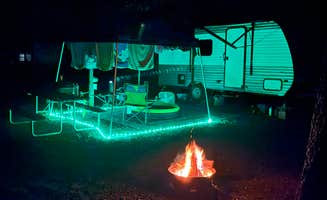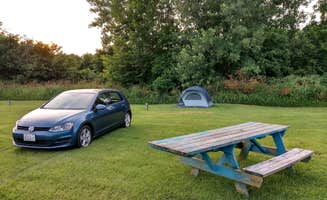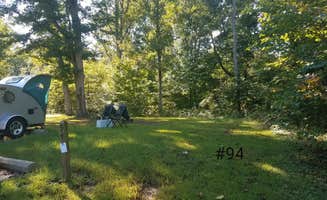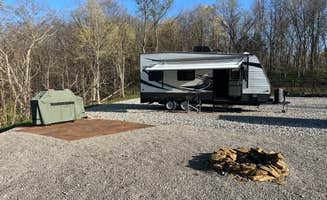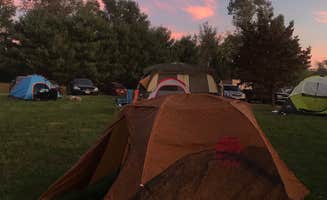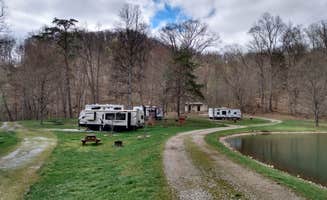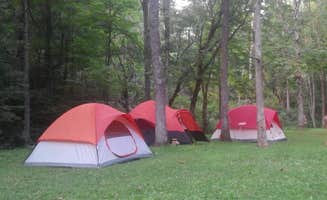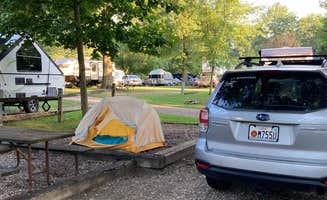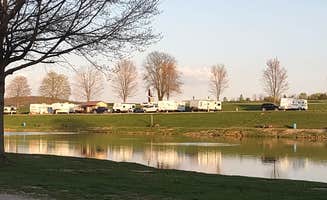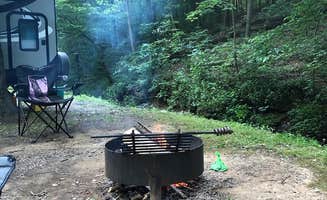The Ohio River Valley region near Letart, West Virginia sits at approximately 580 feet of elevation where the river creates a natural border between West Virginia and Ohio. This area experiences four distinct seasons with average summer temperatures in the mid-80s and winter lows frequently below freezing. Campgrounds in this region typically open from April through October, though some locations operate year-round with reduced amenities during winter months.
What to do
Disc golf access: At Forked Run State Park Campground, the 18-hole course provides an alternative recreation option beyond typical water activities. "There is disc golf. fishing. swimming. hiking," notes one visitor who ranked the scenic course among their favorite attractions.
Fishing opportunities: Catfishing remains popular at Chief Cornstalk Wildlife Management Area, though the facilities are minimal. As one camper reported, "Going for a one or two night stay is plenty for catfishing or day fishing. Though you would need to bring everything with you for cooking and using the bathroom."
Water recreation: Paddle sports are accessible at several locations with boat rentals available seasonally. At Lake Hope State Park, "we even spent some time at the lake and rented a paddle board and a water bike which was so much fun! We also did some kayaking as well as driving to different hiking paths around the area."
What campers like
Privacy at new locations: The newest camping option near Letart is Farver Acres, which opened in 2025 with just three sites total. As one camper noted, "We didn't see another person for four full days — it was such a rare and welcome break from traditional campgrounds."
Historical connections: The region offers opportunities to explore its industrial past. Lake Hope State Park provides access to historic iron furnace sites. "As history buffs will know that Ohio was one of the nation's leading iron producers back in the day," explains one reviewer who also recommended visiting "the haunted Moonville Tunnel" nearby.
Small town exploration: Several campgrounds provide access to river towns with local businesses. "We did a couple day trips down to Pomeroy, which is a nice little river town with ice cream, playgrounds, and shops less than five miles from the campground," shared one family staying at Kountry Resort Campground.
What you should know
Bathroom condition variations: Facility quality differs dramatically between campgrounds. One camper at Krodel Park Campground reported, "If you tent camp they don't allow access to the bathrooms other than a porta potty open to the public and no showers either. Kinda messed up."
Limited site privacy: Many established campgrounds feature open layouts with minimal vegetation between sites. "Sites are close together in rows. No obstructing foliage," notes a camper at Gallia County Junior Fairgrounds, which operates primarily as basic overnight accommodations.
Payment options: Several campgrounds require cash payment on arrival. At Krodel Park Campground, "Cash only or check is also a bit inconvenient and archaic in 2025," complained one visitor, though most found the budget-friendly rates worth the inconvenience with one noting it was the "Cheapest to visit the Mothman."
Tips for camping with families
Budget activities: Fairgrounds camping provides economical access to local attractions. "This type of overnighting suits our lifestyle when we want a quick overnight with full hook ups," noted a visitor to Gallia County Junior Fairgrounds, citing the flat terrain and open field camping as ideal for families.
Wildlife viewing: The quieter campgrounds offer better wildlife experiences. At Hocking Hills State Park Campground, families can enjoy casual hiking with young children: "We enjoyed it with our large breed dog and toddler. The camping however left a lot to be desired."
Pool access: For summer visits with children, certain campgrounds offer swimming pools. At Kountry Resort Campground, "There are a lot of amenities but they need updated. The playgrounds need replaced. The activities building had a pool and game room area, which we used a lot. These were dated as well but our kids had a blast."
Tips from RVers
Site selection challenges: At several campgrounds, finding your assigned site can be difficult. One RVer at Krodel Park Campground reported: "Pulled in late at night around 9pm, map was slightly confusing and our site number was facing the opposite direction of what you would think. The sites are very tight and hard to pull into."
Leveling requirements: Many campgrounds in the hilly terrain require substantial leveling equipment. One RVer at Lake Hope State Park noted: "Camp sites are very small and very unlevel, had to raise back of camper and put front about a 1/4" off ground to get close to level. Site around is sloped in all directions."
Electrical connections: Check for proper electrical hookups before booking. While many campgrounds advertise electric sites, the amperage varies. "Sites are small back in, we stayed in loop two site 69 with great shade and electric," reported a camper at Forked Run State Park, where the older electrical infrastructure sometimes causes issues for larger rigs.


